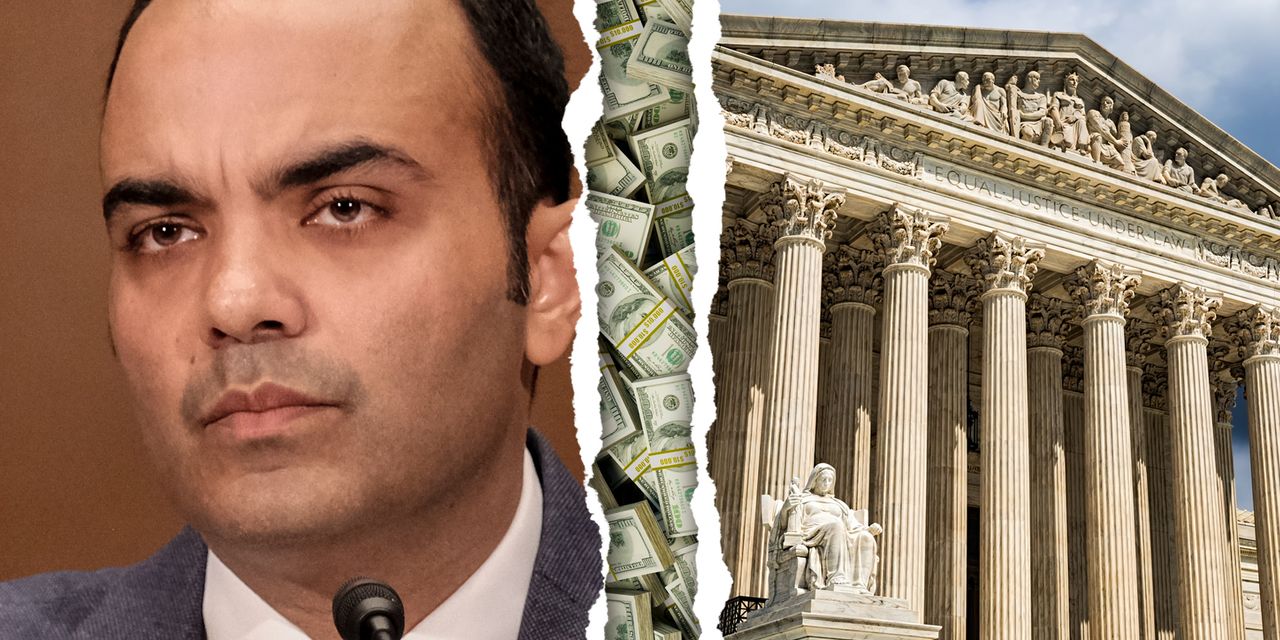The Consumer Financial Protection Bureau, a federal agency that rose from the wreckage of the Great Recession, is readying for a high-stakes fight Tuesday at the U.S. Supreme Court.
The CFPB was created as part of the Dodd-Frank Act, a sweeping 2010 law passed in the aftermath of the Great Recession that aimed at the weak spots in financial regulation.
Key to the current case is a law that goes right to the very existence of the CFPB — where the agency gets its money. The Federal Reserve funds the CFPB rather than Congress, which provides funding for most other federal agencies.
Lawyers representing payday lenders say such a funding structure violates the constitution, which states that “no money shall be drawn from the Treasury, but in consequence of appropriations made by law.”
“Key to the current case is a law that goes right to the very existence of the CFPB. Lawyers representing payday lenders say receiving funding from the Federal Reserve violates the constitution.”
Oral arguments will be heard on Tuesday for the case, which centers on a disputed rule about payday loans, it touches on the deeper question whether the agency’s funding is constitutional and its rules are legitimate.
The CFPB is involved with the oversight of various aspects of a consumer’s financial life, from the rules governing debt collection and credit reports to the rules for student-loan servicers.
Critically, the ramifications of the Supreme Court’s decision could go beyond rules on payday loans if the court ultimately decides to take a broad look at the CFPB’s jurisdiction.
Related: Payday lenders want Supreme Court to gut the CFPB. They paid $200 million in fines to regulators, records show.
Wider implications for mortgages
But would-be homebuyers, sellers and lenders could be in store for some of the biggest shockwaves. If the court invalidates how the CFPB is funded and casts doubt on a wider range of regulations beyond payday loans, the results could be access to fewer mortgages, observers say.
Here’s why: The CFPB sets out rules on deceptive practices to protect consumers, and if the CFPB were to lose its funding, new questions could arise about whether it still had the power to enforce its rules. Such a situation would, in theory, make it harder for borrowers and lenders to navigate the complex process of taking out a home loan.
“It might be that banks would be unwilling to make mortgage loans if they don’t have the security of being able to rely on the CFPB rules, and that would mean people couldn’t get mortgages,” said Jeff Sovern, a professor of consumer law at the University of Maryland Francis King Carey School of Law.
“That would prevent people from buying homes, selling homes and that would be terrible for the country,” he added.
“The CFPB sets out rules on deceptive practices to protect consumers, and if it were to lose its funding, new questions could arise about whether the agency still had the power to enforce its rules. ”
One possible outcome: mortgages could become more expensive as lenders charge more to cover their costs as borrowers and lenders remain unsure about the rules for upfront disclosures on loan costs or what counts as a safe mortgage, they add.
“This case is all about financial fairness,” said Mitria Spotser, federal policy director at the Center for Responsible Lending. If the CFPB lost the source of its funding, consumers “would bear the burden in figuring whether financial institutions were giving them a product they could succeed with, not only accessing home ownership, but maintaining it,” she said.
“Moving to a world where the future of housing finance oversight is uncertain and unknown, including the number of years we would be living under such mystery, should raise serious shared trepidations among market participants, financial markets and consumers alike,” CFPB Director Rohit Chopra told mortgage-industry members last month.
“Critically, the ramifications of the Supreme Court’s decision could go beyond rules on payday loans if the court ultimately decides to take a broad look at the CFPB’s jurisdiction.”
Mortgage- and housing-industry trade groups have urged the Supreme Court to keep its decision tightly focused on payday lending. Whatever the court decides, there could be “chaos” if the ruling casts doubt on CFPB rules that the mortgage industry has spent years following, the Mortgage Bankers Association, National Association of Home Builders and the National Association of Realtors said in a friend-of-the-court brief.
Those rules include what counts as a “qualified mortgage,” the filing said. Lenders have used those rules to originate millions of mortgages, following certain loan terms and protections while staying shielded from lawsuits, the filing said.
Another set of CFPB rules involve the breakdown on loans and closing costs, said Christie DeSanctis, director of federal banking, lending and housing finance policy at the National Association of Realtors.
“This is one of the biggest financial transactions that a consumer can make, and the CFPB governs those regulations that ensure there’s that adequate transparency and protection as they engage in this process,” she said.
The origins of Tuesday’s case
In 2017, a rule related to payday lending blocked lenders from trying to withdraw loan repayments from borrowers after two straight failed attempts because of insufficient funds. Extra attempts without a new authorization from the consumer would just rack up more bank fees for the consumer, the CFPB said in court papers.
The Community Financial Services Association of America, a trade group representing payday lenders, sued, and the Fifth Circuit Court of Appeals vacated that rule, arguing that the CFPB’s funding structure violated the constitution’s separation of powers giving lawmakers the power of the purse, the three-judge panel said.
Fast forward to 2023: The current Supreme Court case is about restoring checks and balances after lawmakers “crafted the CFPB to operate free of any political accountability,” the Community Financial Services Association of America (CFSAA) said in court papers related to the case being heard by the Supreme Court Tuesday.
The CFSAA did not respond to a request for comment.
“Others argue that applying congressional funding procedures to the CFPB would also subject it to political wrangling and special interests that would weaken its mission to protect consumers.”
In court papers, the CFSAA said the CFPB has options if the Supreme Court rules that the agency’s funding is unconstitutional. “The bureau’s sky-may-fall rhetoric is unwarranted.” There are various ways the agency can defend previous actions and rules that are already on the books, it said.
There are ways the court can minimize “disruption,” business groups, led by the U.S. Chamber of Commerce, said in a friend-of-the-court brief.
“Put the CFPB under congressional budget oversight. This would involve subjecting the agency to the traditional appropriations process,” Bill Hulse, senior vice president for the chamber’s Center for Capital Markets Competitiveness, said in a Monday blog post.
Others disagree. Applying congressional funding procedures to the CFPB would also subject it to political wrangling and special interests that would weaken its primary mission to protect consumers, Sovern, the consumer-law professor, said.
If the court directs Congress to restructure the CFPB, it would be doing so in a time of political gridlock, he noted. “I’m concerned [the Supreme Court] will invalidate the CFPB or hamstring it by subjecting it to the appropriations process. Whether it will do that, I don’t know. But I’m hoping it won’t,” Sovern said.
Read the full article here





